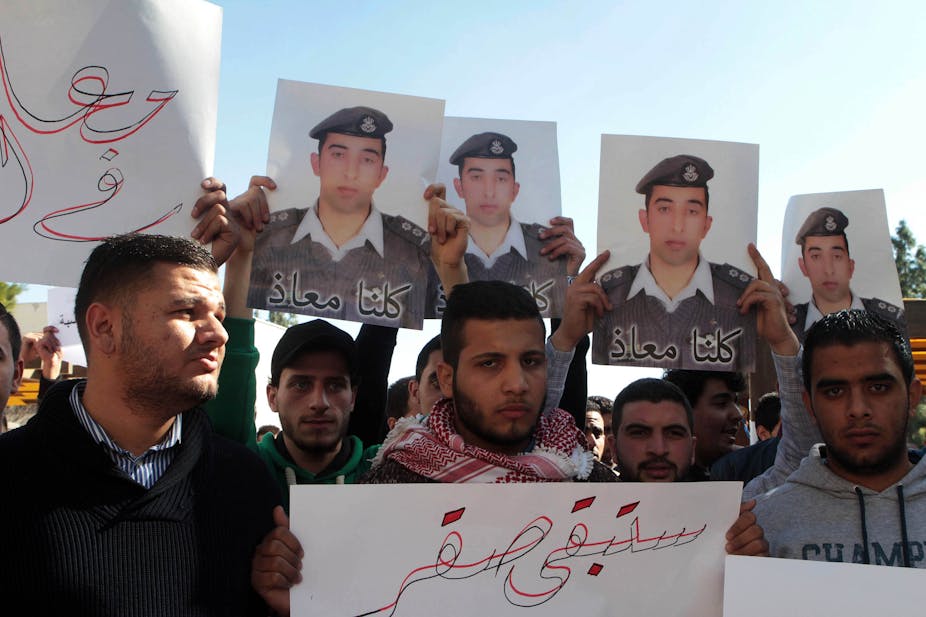The execution of the Jordanian pilot Moaz al-Kasasbeh by Islamic State was both horrific and barbarous – and part of a well-calculated strategy.
By killing this young man in this manner, and with maximum publicity, IS is pursuing two aims. It is trying to intimidate the Jordanian pilots who are involved in the air strikes that started nearly six months ago. All those pilots now know just what will happen to them if they fall into the hands of IS paramilitaries. IS has even named other pilots from Jordan currently engaged in the air war.
The second is part of a systematic attempt to fuel dissent within Jordan, where a significant minority of the population has not supported the government’s role in the war so far.
This is why Jordan’s official response to al-Kasasbeh’s killing, executing Sajida al-Rishawa ten years after her role in the bombing of western hotels in Amman, has little to do with IS directly. Instead, it is calculated to an appeal to Jordanians who support the government, and whose confidence in the anti-IS effort will now be badly dented.
Second thoughts
While al-Kasabeh’s execution will increase support for the air war in many sectors of Jordanian society, it will badly undermine it in others – and its military impact is also not to be underestimated.
IS will have greatly intimidated the pilots flying on the bombing raids, of whom there are a great many. Few people in Western states are aware of just how big an operation this is. Judging by the latest official figures, there have now been more than 1,800 air strikes on thousands of targets using close to 7,000 bombs and missiles, with more than 1,000 people killed, including civilians.
This sustained effort involves a number of countries in the region and many from the West. All of those aircrew, whether pilots or navigators, now have a terrible example of what awaits them if they are captured.
Even before this most recent incident, this strategy was already having a serious impact. It has now emerged that in December 2014, the United Arab Emirates, one of the key allies in the war, stopped its involvement in the air strikes because of fears for the safety of its pilots.

And now that Western troops are now getting involved in direct combat on the ground – in spite of repeated statements to the contrary from Barack Obama, David Cameron and others – the threat of capture will be even more worrisome.
For the moment, those Western forces involved are mainly special forces – with Canadians involved in direct firefights with IS paramilitaries on at least three occasions in recent weeks – but the more troops that are deployed to Iraq, the more the risk of capture grows.
In one little-publicised climbdown, the UK government was meant to commit a substantial force of trainers (200 strong, with a similar number for protection) to help train Iraqi army units, but the decision was suddenly put on hold at the end of December. According to “senior defence sources”, this was because of the risk of British soldiers getting killed or held hostage in the run-up to the election on May 7.
Us versus them
IS’s killing of Lt al-Kasasbeh and the graphic video of his dying was also a deliberate attempt to incite anti-Islamic feeling and actions, particularly in Western states with minority Muslim populations. The overwhelming majority of Muslims in Western countries are bitterly opposed to IS, and the number of committed jihadists in the West at any one time is in all probability tiny. But IS is betting that any increase in Islamophobia stands a good chance of bringing in new foreign recruits.
The fundamental issue is that for IS to convincingly portray itself as the guardian of Islam against Western states that have attacked Muslims in Iraq, Syria, Afghanistan, Pakistan, Somalia, Yemen, Mali, Libya and elsewhere, it needs to generate more conflict with the West. The more military action it faces, the better it can argue its distorted case.
Ultimately, al-Kasasbeh’s murder is nothing more than an incitement to further Western attacks. Whatever Jordan does, governments must be as careful as they can as they work out how to respond.

